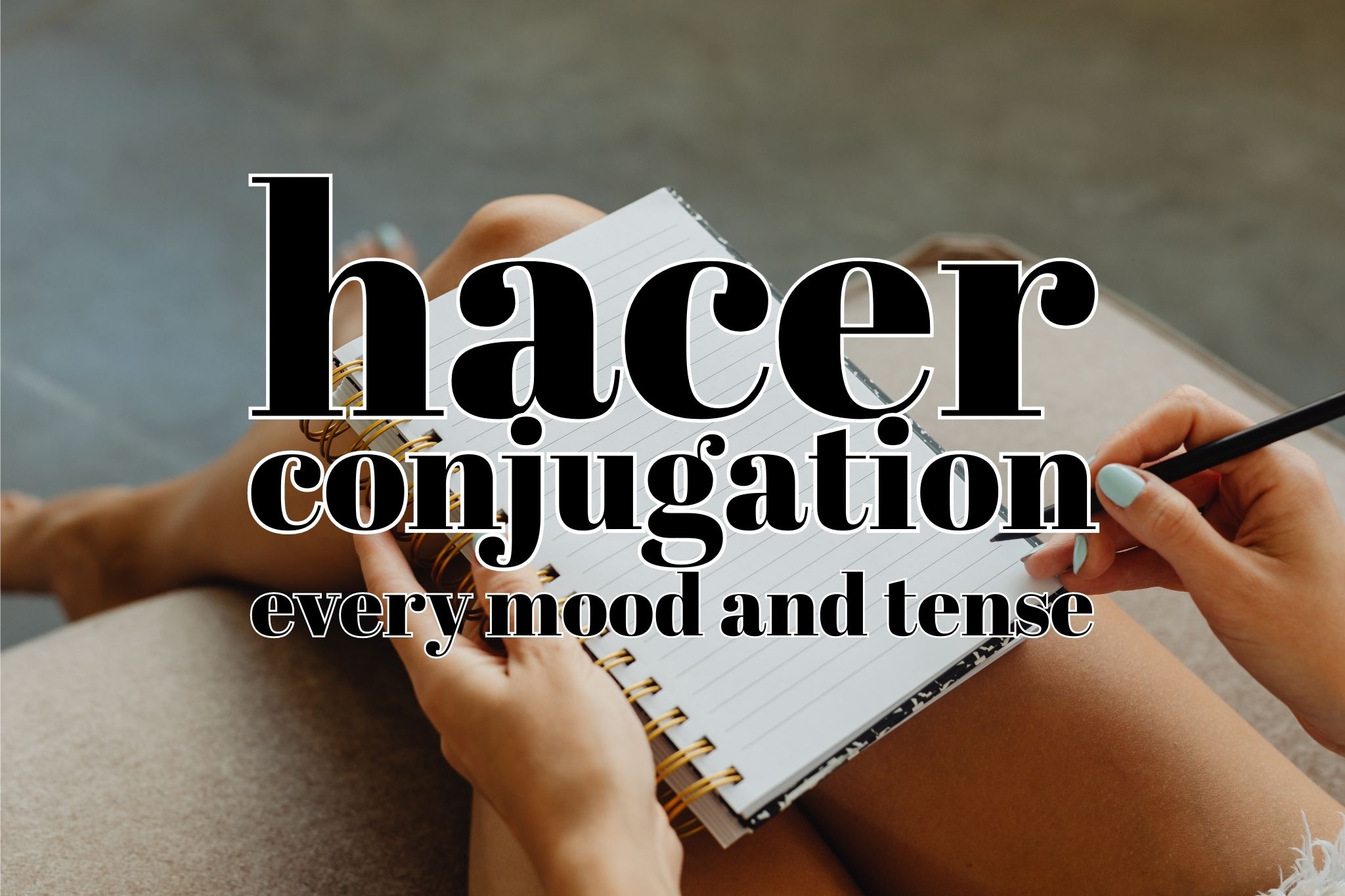Hacer Conjugation: The ultimate guide on how to conjugate Hacer in Spanish

Get our free email course, Shortcut to Conversational.
Have conversations faster, understand people when they speak fast, and other tested tips to learn faster.
More infoThe verb hacer is one of those key verbs in Spanish, widely used in many contexts and to express multiple ideas. Hacer is among the most essential verbs, in the same category as others like ser, estar, or tener.
As you’re surely aware, one of the most outstanding characteristics of the Spanish language is that it has so many verb conjugations. Therefore, studying Spanish implies that you need to learn how to conjugate them! In our series of posts on specific verb conjugations, here at BaseLang we make this aspect of learning Spanish that much easier for you.
Today’s post will cover everything you neeed to know about hacer conjugation in Spanish. We’ll present you with the main meanings of hacer, then we’ll divide our hacer conjugation sections into three big groups according to mood: indicative, subjunctive, and imperative. From there, each mood will be broken down by tense, with their sections on hacer present conjugations, past conjugations, perfect conjugations, future conjugations, and finally compound conjugations.
Let’s dive into our post on hacer conjugation and start doing something with it! – ¡Empecemos a hacer algo con ello!
Hacer Meanings
Hacer is one of those verbs that’s used on an everyday basis in Spanish, and it can express a wide range of concepts. Here we present the most common uses of the verb hacer in Spanish before we bring our focus to hacer conjugation.
Hacer meaning: to do
- Fernando did all he could to help us. – Fernando hizo todo por ayudarnos.
- Yesterday, we tried to do all the work. – Ayer intentamos hacer todo el trabajo.
Hacer meaning: to create or build [something]
- The artist created a wonderful work of art. – El artista hizo una obra maravillosa.
- My grandparents built this house with great effort. – Mis abuelos hicieron esta casa con mucho esfuerzo.
Hacer meaning: to make
- Kevin makes me really happy. – Kevin me hace muy feliz.
- Patricia will make the birthday cake. – Patricia hará el pastel de cumpleaños.
These are the most common uses of the verb hacer in Spanish. There are some other specific ways in which this verb can be used, but that level of detail deserves a post of its own! For now, let’s explore our hacer conjugation in Spanish.
Hacer Indicative Mood
In Spanish, we use the indicative mood to express statements, certainties, and facts. In this section of the post we’ll cover all the indicative tenses of hacer in Spanish: we’ll see the hacer conjugation in the indicative present, preterite, imperfect, conditional, and future tenses, and then we’ll see the compound indicative forms.
Hacer present tense conjugation
Hacer is an irregular verb in the present tense, with a stem change in its first-person singular form. The rest of the conjugations remain regular: they’re conjugated just like any regular Spanish -er verb.
| Subject | Hacer present tense conjugation |
| Yo | hago |
| Tú | haces |
| Él, Ella, Usted | hace |
| Nosotros, Nosotras | hacemos |
| Vosotros, Vosotras | hacéis |
| Ustedes, Ellos, Ellas | hacen |
- I do my homework every day. – Hago la tarea todos los días.
- Olga makes extremely beautiful crafts. – Olga hace unas artesanías bellísimas.
- The kids make the bed every day. – Los niños hacen la cama todos los días.
- We do exercises at the gym. – Nosotras hacemos ejercicios en el gimnasio.
To learn more about this Spanish tense, take a look at our post on the present tense in Spanish. We can also recommend our post on GO verbs in Spanish.
Hacer past tense conjugation
In the hacer preterite conjugation, it is important to notice the change from “a” to “i” in the stem. These conjugations all follow this irregular form.
| Subject | Hacer past tense conjugation |
| Yo | hice |
| Tú | hiciste |
| Él, Ella, Usted | hizo |
| Nosotros, Nosotras | hicimos |
| Vosotros, Vosotras | hicisteis |
| Ustedes, Ellos, Ellas | hicieron |
- They made a delicious dinner for us. – Nos hicieron una cena deliciosa.
- We did as we saw fit. – Hicimos lo que creímos que era adecuado.
- They always did business with the government. – Ellos siempre hicieron negocios con el gobierno.
- Laura and Adrián threw the biggest wedding party of the town. – Laura y Adrián hicieron la fiesta de boda más grande del pueblo.
For more on this tense, check our post on the Spanish preterite. We also have a dedicated post looking at irregular preterite verbs.
Hacer imperfect conjugation
In this case, the verb hacer remains regular for all grammatical persons. That is, it takes the regular -ía endings like other regular -er verbs.
| Subject | Hacer imperfect conjugation |
| Yo | hacía |
| Tú | hacías |
| Él, Ella, Usted | hacía |
| Nosotros, Nosotras | hacíamos |
| Vosotros, Vosotras | hacíais |
| Ustedes, Ellos, Ellas | hacían |
- What were you doing in the basement? – ¿Qué hacías en el sótano?
- Her friends would always make a farewell meal for her. – Sus amigos siempre le hacían una comida especial de despedida.
- Every year they would make the same presentation. – Cada año hacían la misma presentación.
If you need to review this tense, you can go through our comprehensive guide to the imperfect tense in Spanish. Additionally, we have a separate article making the comparison between the preterite vs imperfect tenses.
Hacer conditional conjugation
For the conditional conjugations of hacer, you’ll notice that the “c” in the stem changes to “r” in all its forms. As for the endings, all the subjects take the regular conditional verb endings on the har- stem.
| Subject | Hacer conditional conjugation |
| Yo | haría |
| Tú | harías |
| Él, Ella, Usted | haría |
| Nosotros, Nosotras | haríamos |
| Vosotros, Vosotras | haríais |
| Ustedes, Ellos, Ellas | harían |
- They would do their work if they weren’t so lazy. – Harían su trabajo si no fueran tan vagos.
- Would you make that effort for me? – ¿Harías ese esfuerzo por mí?
- Cintia told me she would make the empanadas in an hour. – Cintia me dijo que haría las empanadas en una hora.
If you want more details on the conditional mood in Spanish, check out our dedicated guide to the Spanish conditional.
Hacer future conjugation
Note that in the hacer future conjugation, the stem is just like the previous conjugation, the conditional form. The endings are the same as any regular verb in the indicative future tense.
| Subject | Hacer future conjugation |
| Yo | haré |
| Tú | harás |
| Él, Ella, Usted | hará |
| Nosotros, Nosotras | haremos |
| Vosotros, Vosotras | haréis |
| Ustedes, Ellos, Ellas | harán |
- Soon we’ll make the trip to China. – Haremos el viaje a China pronto.
- Agustina and Rocío will make peace at the party. – Agustina y Rocío harán las pases en la fiesta.
- I’ll do 50 sit-ups in 30 seconds. – Haré 50 abdominales en 30 segundos.
For more on this tense and a couple of other ways to refer to the future, check our post on how to talk about the future in Spanish.
Hacer compound conjugations
Here we present you with the hacer conjugation chart for the perfect forms. All the indicative perfect forms of the verb hacer are created with the conjugation of the auxiliary verb haber and adding the participle of hacer: hecho.
In case you need to review this aspect of Spanish grammar, take a look at our dedicated post on past participles in Spanish.
The gerund of hacer for progressive forms is haciendo.
For now, we’ll start with the present perfect and past perfect conjugation of hacer.
| Subject | Present perfect | Past perfect |
| Yo | he hecho | había hecho |
| Tú | has hecho | habías hecho |
| Él, Ella, Usted | ha hecho | había hecho |
| Nosotros, Nosotras | hemos hecho | habíamos hecho |
| Vosotros, Vosotras | habéis hecho | habíais hecho |
| Ustedes, Ellos, Ellas | han hecho | habían hecho |
- Did you make this whole mess all on your own? – ¿Has hecho todo este lío tú solo?
- We’ve done the best that we could. – Hemos hecho lo mejor que pudimos.
- That morning the weather had been really cold in Paris. – Esa mañana había hecho mucho frío en París.
- The runners had done exercises before the race. – Los corredores habían hecho ejercicio antes de la carrera.
For detailed guides on how to use these compound verb forms, check our posts on present perfect in Spanish and past perfect in Spanish.
Let’s now turn our attention to the other two compound indicative tenses, the perfect future and the perfect conditional.
| Subject | Perfect future | Perfect conditional |
| Yo | habré hecho | habría hecho |
| Tú | habrás hecho | habrías hecho |
| Él, Ella, Usted | habrá hecho | habría hecho |
| Nosotros, Nosotras | habremos hecho | habríamos hecho |
| Vosotros, Vosotras | habréis hecho | habríais hecho |
| Ustedes, Ellos, Ellas | habrán hecho | habrían hecho |
- By the end of the day, I will have done my homework. – Al final del día habré hecho la tarea.
- In a year, they will have built the church. – Dentro de un año habrán hecho la iglesia.
- Would you have made everyone’s beds if I had asked you to? – ¿Habrías hecho las camas de todos si te lo hubiera pedido?
- I wouldn’t have made that comment had I known you would get offended. – No habría hecho ese comentario si hubiera sabido que te ofenderías.
For more details on both of these compound tenses, we recommend our posts on the future perfect tense in Spanish and on the conditional form in Spanish.
Hacer Subjunctive Mood
The subjunctive mood in Spanish is commonly used to express uncertainty, wishes, doubts, desires, necessities and possibilities. Let’s dive into our hacer subjunctive conjugation and see what the different tenses of this mood have to offer.
Hacer present subjunctive conjugation
We’ll leave you with a pro tip here: first take the indicative present tense form of the verb hacer, which is hago. Then remove the -o and replace it with the regular endings -a, -as, -a, -amos, -áis, and -an, as shown here in our hacer present subjunctive conjugation chart.
| Subject | Hacer present subjunctive conjugation |
| Yo | haga |
| Tú | hagas |
| Él, Ella, Usted | haga |
| Nosotros, Nosotras | hagamos |
| Vosotros, Vosotras | hagáis |
| Ustedes, Ellos, Ellas | hagan |
- The fact that I do all the work doesn’t mean I want to do it. – Que yo haga todo el trabajo, no significa que lo quiera hacer.
- Anything we do will be alright. – Cualquier cosa que hagamos estará bien.
- Whenever you do something good, you will know it. – Cuando hagas algo bueno lo sabrás.
To dig deeper, take a look at our post on the present subjunctive tense in Spanish.
Hacer imperfect subjunctive conjugation
The stem of hacer in the imperfect subjunctive conjugation is hic-. Note that this subjunctive tense has two possible conjugations; we’ve included both here, you can choose either one!
| Subject | Hacer imperfect subjunctive conjugation |
| Yo | hiciera / hiciese |
| Tú | hicieras / hicieses |
| Él, Ella, Usted | hiciera / hiciese |
| Nosotros, Nosotras | hiciéramos / hiciésemos |
| Vosotros, Vosotras | hicierais / hicieseis |
| Ustedes, Ellos, Ellas | hicieran / hiciesen |
- We didn’t like that you made a drama out of this. – No nos gustó que hicieras un drama de esto.
- I wish we’d done everything as quickly as they wanted. – Ojalá hiciéramos todo tan rápido como ellos quieren.
- I don’t know what I would do if she were to do that again. – No sé que haría si ella hiciera eso otra vez.
Check out our post on the Spanish imperfect subjunctive for a more in-depth explanation of its use. Also, you can learn more about the subjunctive trigger word ojalá that we used in second the example above.
Hacer future subjunctive
Here is a quick tip for the hacer future subjunctive conjugation: take the imperfect subjunctive we just saw above, and change the final -a of the hiciera form to -e, and you’ll have the future subjunctive!
| Subject | Hacer future subjunctive conjugation |
| Yo | hiciere |
| Tú | hicieres |
| Él, Ella, Usted | hiciere |
| Nosotros, Nosotras | hiciéremos |
| Vosotros, Vosotras | hiciereis |
| Ustedes, Ellos, Ellas | hicieren |
- Anyone making noise will be fined. – El que hiciere ruido será multado.
- If the teacher doesn’t do his job, he’ll be fired. – Si el profesor no hiciere su trabajo, será despedido.
We must remark that future subjunctive verb forms are not normally used in everyday conversations. They’re mostly seen in regulations or official texts.
Hacer subjunctive compound conjugations
Just like we did with the compound conjugations of hacer in the indicative, now we present you with the compound hacer subjunctive conjugation chart.
These hacer compound conjugations are built from the present and imperfect subjunctive forms of the auxiliary haber, followed by the participle of hacer, which is hecho.
| Subject | Perfect subjunctive | Pluperfect subjunctive |
| Yo | haya hecho | hubiera hecho / hubiese hecho |
| Tú | hayas hecho | hubieras hecho / hubieses hecho |
| Él, Ella, Usted | haya hecho | hubiera hecho / hubiese hecho |
| Nosotros, Nosotras | hayamos hecho | hubiéramos hecho / hubiésemos hecho |
| Vosotros, Vosotras | hayáis hecho | hubierais hecho / hubieseis hecho |
| Ustedes, Ellos, Ellas | hayan hecho | hubieran hecho / hubiesen hecho |
- This is completely different to anything else I have done. – Esto es completamente diferente a cualquier cosa que haya hecho.
- Once we have done that, we’ll better understand what’s going on. – Una vez que hayamos hecho eso, entenderemos mejor lo que está sucediendo.
- If you had done your job on time, you would not be so stressed now. – Si hubieras hecho tu trabajo a tiempo, ahora no estarías tan estresado.
- I wish Berta had done something better. – Ojalá Berta hubiera hecho algo mejor.
Hacer Imperative Mood
The imperative mood is used to give commands, orders, and suggestions in a direct manner. This mood doesn’t include conjugations for the subject yo, because we generally don’t give orders to ourselves.
| Subject | Hacer imperative |
| Tú | haz |
| Él, Ella, Usted | haga |
| Nosotros, Nosotras | hagamos |
| Vosotros, Vosotras | haced |
| Ustedes, Ellos, Ellas | hagan |
- Do your thing, don’t wait any longer. – Haz lo tuyo, no esperes más.
- Do as we’ve told you to do. – Haced tal como les hemos dicho.
- Stop making noise, please. – No hagan más ruido por favor.
If you are interested in learning more about the imperative mood in Spanish, check out our post on how to express commands in Spanish.
Conclusion
So far so good! We’ve covered all you need to know to express the verb hacer in all possible moods and tenses. We began by giving you a brief guide on hacer meanings, and we dove straight in to present every hacer conjugation chart. We broke the tenses down by indicative, subjunctive, and imperative moods, and we provided a bunch of examples in each one to give you a better understanding of how to use hacer in each and every tense in Spanish!
With that, we’re sure that you have enough information to learn and process. If you want to test your memory in the meantime, why not do some exercises? – ¿por qué no hacer algunos ejercicios?
Exercises
Fill in the blank with the hacer conjugation corresponding to the mood and tense indicated in parentheses. The answers and translations are below.
1. _____ lo que quieras. (imperative: tú)
2. Ojalá mis amigas y yo _____ la reserva en el restaurante a tiempo.(subjunctive: pluperfect)
3. No queríamos que Tomás _____ todo el trabajo solo. (subjunctive: imperfect)
4. Que no _____ lo que te dijo tu esposa, te traerá problemas. (subjunctive: present)
5. _____ algo mejor si nos lo hubieran pedido con anticipación. (indicative: perfect conditional)
6. Para 2015, los comerciantes ya _____ demasiados viajes a Panamá. (indicative: past perfect)
7. Pronto, Romina _____ los planes para el viaje a la Patagonia conmigo. (indicative: future)
8. ¿Vosotros _____ eso por mí? (indicative: conditional form)
9. En la escuela, siempre _____ dibujos de los padres de la patria. (indicative: imperfect)
10. Mientras nosotros limpiamos, ellas _____ la cena. (indicative: present)
Answers
1. Haz lo que quieras. – Do whatever you want.
2. Ojalá mis amigas y yo hubiéramos hecho la reserva en el restaurante a tiempo. – I wish my friends and I had made the restaurant reservation on time.
3. No queríamos que Tomás hiciera todo el trabajo solo. – We didn’t want Tomás to do all the work alone.
4. Que no hagas lo que te dijo tu esposa, te traerá problemas. – Not doing what your wife told you to do, will get you into trouble.
5. Habríamos hecho algo mejor si nos lo hubieran pedido con anticipación. – We would have done something better if you had asked for it in advance.
6. Para 2015, los comerciantes ya habían hecho demasiados viajes a Panamá. – By 2015, the merchants had already made too many trips to Panama.
7. Pronto, Romina hará los planes para el viaje a la Patagonia conmigo. – Soon, Romina will make plans for the trip to Patagonia with me.
8. ¿Vosotros haríais eso por mí? – Would you do that for me?
9. En la escuela, siempre hacíamos dibujos de los padres de la patria. – At school, we would always make drawings of the founding fathers.
10. Mientras nosotros limpiamos, ellas hacen la cena. – While we clean, they make dinner.



